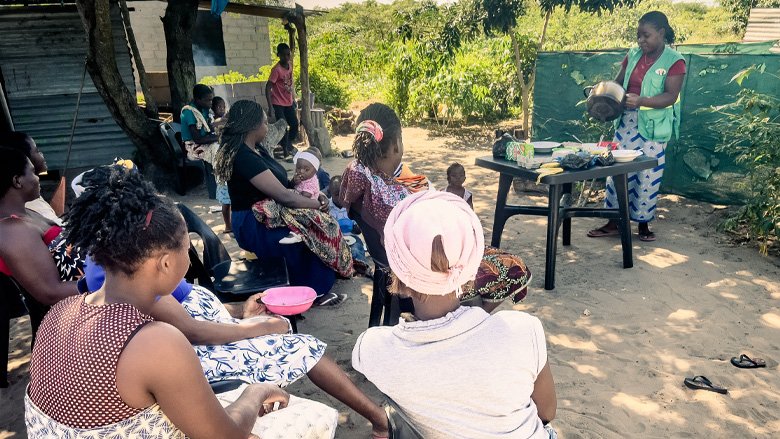Investing in a skilled, healthy workforce, infrastructure, and technology are crucial for economic growth, job creation, and security. By prioritizing health, countries build the foundation for the human capital that drives job creation, shared prosperity and improved societal well-being. For example, investing in nutrition is smart economics, with every dollar spent generating up to $23 in returns through better health outcomes and increased productivity.
But investing in health is not just about improved health outcomes—it is a catalyst for broader economic and employment benefits, particularly for women, who make up over 70% of the global health workforce but hold only 25% of senior roles.
However, insufficient investments in health continue to hinder progress. Governments in low-income countries spend less than 2% of GDP on health, leaving millions without essential care. Without strategic investments, health systems will struggle to meet the demands of aging populations, rising non-communicable diseases, and emerging health threats. This underinvestment leads to economic stagnation and reduced productivity. The World Bank estimates that failing to invest in health systems that support longevity could lead to economic losses amounting to billions annually, weakening long-term growth potential.
Investing in health creates jobs and strengthens economies
Investments in health have far-reaching effects, boosting broader economic growth and job creation. Such investments create direct jobs, such as those held by doctors and nurses, and indirect opportunities in pharmaceuticals, biotechnology, medical technology, digital health, and support services. There is also a multiplier effect with more jobs being created beyond the health sector. For example, in low-income countries, each job within the health sector generates an estimated 3.4 additional jobs across related industries in the health ecosystem, further catalyzing economic growth and resilience.
To achieve sustainable economic growth, job creation, and strengthened health systems, health financing must be:
Adequate to ensure that systems have the necessary resources to expand coverage and improve service delivery.
Efficient to maximize the impact of health spending and ensure cost-effectiveness.
Equitable to provide all individuals, regardless of income level or geography, access to quality healthcare services.
The World Bank’s role
The World Bank Group is committed to advancing health sector job creation and strengthening health systems through financing, knowledge sharing, and partnerships. The Bank is planning to support developing countries to provide affordable, quality health services to 1.5 billion people by 2030, a milestone that will drive economic development globally. In just one year, 200 million people have been reached through IDA and IBRD financing since the goal was announced in 2024.
Key areas of focus include:
Transforming the health systems labor market: Investing in health workforce expansion is essential for economic growth. In high-income countries, healthcare jobs make up 20% of total employment, compared to just 4-7% in regions like Sub-Saharan Africa and South Asia. To close this gap, strategic investments in workforce development, digital health, and service delivery models are critical. Task shifting, AI-powered diagnostics, telemedicine, and resilient workforce models can improve healthcare access and efficiency, ensuring sustainable employment and better service delivery.
Tackling youth unemployment through the care economy: With millions of young people unemployed and living in poverty in low-income countries, healthcare offers a major opportunity for sustainable jobs. Expanding the care workforce, leveraging AI-driven training, and promoting privately financed training programs can equip young workers with essential skills, create caregiving roles, and enable labor migration while fostering ‘brain gain’ in source countries.
Expanding investment across the healthcare value chain: Beyond frontline workers, strengthening the health sector’s value chain creates jobs and economic resilience. Attracting private investment through regulatory reforms, tax benefits, and concessional financing can drive public-private collaboration between governments, businesses, and philanthropic organizations can accelerate healthcare innovation, expand access, and create sustainable employment opportunities.
Global engagement for a healthier and more prosperous future
Improving health needs all partners. Private companies, public institutions, and governments all play a vital role in improving health outcomes and driving economic growth. Partnerships bring together diverse resources, expertise, and innovation to drive sustainable health solutions, economic growth, and job creation. This includes training health care professionals, building essential infrastructure and technologies to scale primary health services. Through strategic health investments, we can build stronger, more resilient societies. The World Bank collaborates closely with governments, private sector leaders, civil society organizations, and other international development partners to amplify the impact of health investments globally.
Results
The World Bank supports countries to drive better health outcomes, economic gains and sustainable jobs
In Indonesia, the World Bank has supported major health and nutrition reforms, contributing over $5 billion since 2018. With co-financing from development partners, efforts have expanded health insurance to 98% of the population by 2024. National stunting rates dropped nearly 10 percentage points over five years, supported by training thousands of community volunteers. Programs also strengthened care in remote regions, improved service quality, and created jobs, boosting health outcomes and local economic resilience.
In Tanzania, 30 hospitals rolled out a private sector program combining medical equipment and on-the-job training for health workers that led to a 75% drop in maternal deaths and a 40% drop in newborn deaths. It’s now being scaled nationwide with domestic financing and support from IDA, the World Bank fund for the poorest countries.
In Argentina, the World Bank supports the modernization of healthcare through an integrated health care network in the most vulnerable municipalities of Buenos Aires Province. The program advances the digitization of the Integrated Health Record in more than 150 provincial hospitals and municipal health care centers and develops telemedicine for remote medical care.
In Côte d’Ivoire World Bank support helped scale the National Health Insurance program, raising enrollment from 10% in 2023 to 62% by April 2025, with a target of 80% by August 2025. Reforms included mobile enrollment campaigns, improved premium collection, and new public-private partnership regulations—expanding access and building a more resilient, inclusive health system. Our support also creates more than 10,000 direct jobs through the National Health insurance program.


